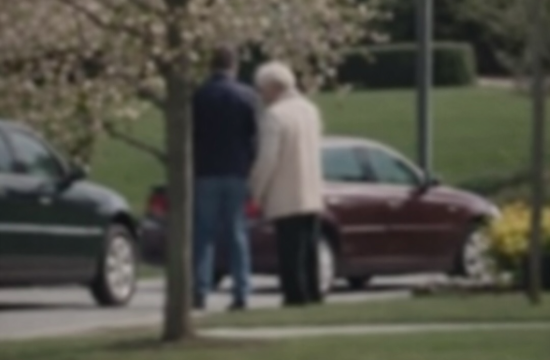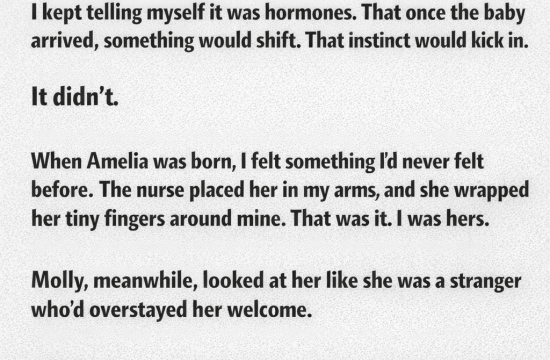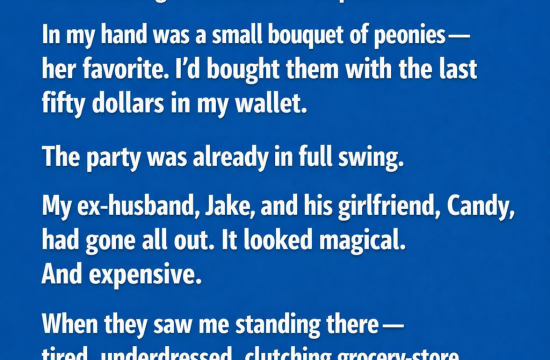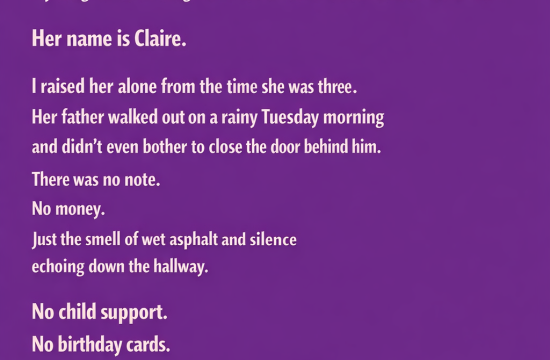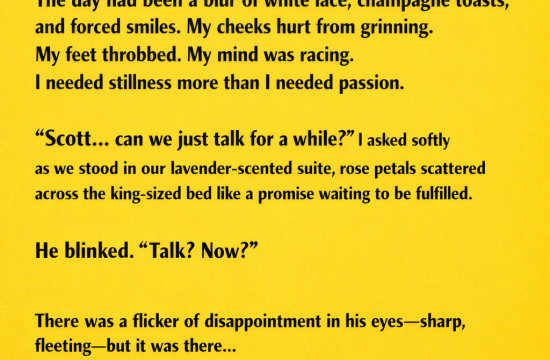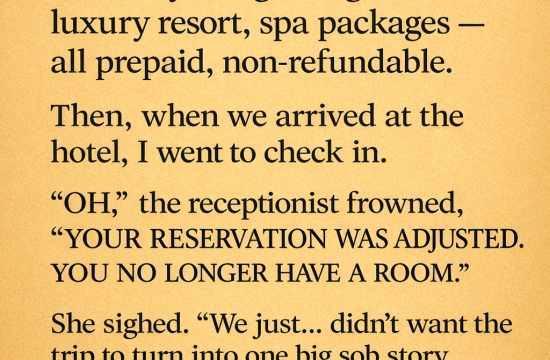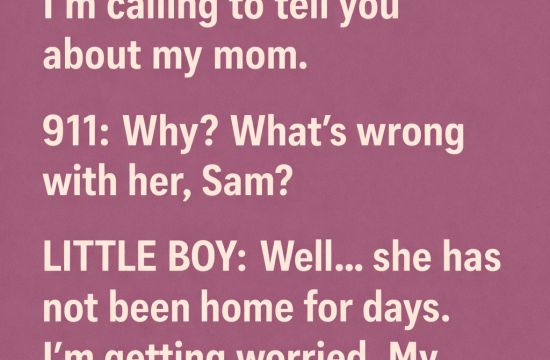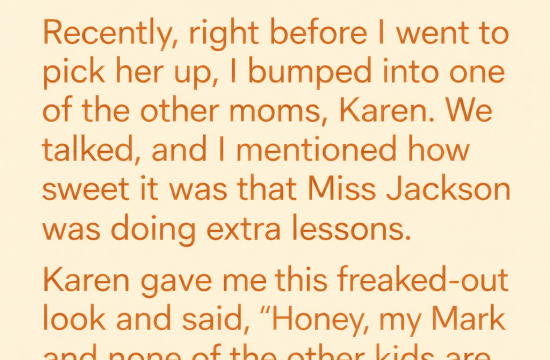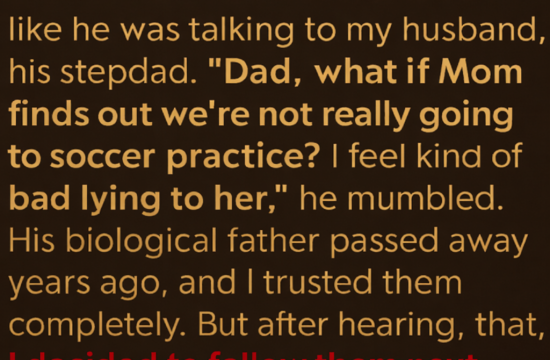For our third anniversary, I told my husband I wanted it to be just us—not another family gathering, not another evening where I was lost in the background while he played the golden son. He agreed instantly. I believed him. I let myself feel hopeful.
But when we arrived at the restaurant, I froze.
His mom, dad, sister, and cousin—with her kids—were already seated, waving at us like they were welcoming guests to a reunion. My heart sank into my stomach. I stopped walking, but he nudged me forward with a smile, completely oblivious to the storm gathering behind my ribs.
I felt like an ornament being placed where it was supposed to go, not a wife being cherished.
Not a partner—just a prop.
As we sat down, his mother patted the seat beside her. “Come here,” she said warmly. “I always knew he’d marry someone who fit into our traditions.”
I smiled because that’s what was expected—but inside, something cracked.
The table was chaos—kids arguing, forks scraping, his sister loudly recounting her day. Even the waiter looked drained. I excused myself to the restroom, leaned on the sink, and stared at my reflection. I wasn’t angry that his family existed—I was angry that he hadn’t protected the one boundary I asked for. Just one.
When I returned, he grabbed my hand and loudly proclaimed his love for me. Before the warmth could reach me, Talia cut in, asking when we planned to have children. My face burned. I looked at my husband, begging him silently to step in. He didn’t. He just laughed awkwardly and changed the subject.
That night, lying awake, I felt hollow. I had spoken my needs clearly, and he either hadn’t heard—or didn’t care.
The next morning, he brought me breakfast in bed—eggs and toast, just how I liked them—but even that gesture felt like paper trying to cover a fracture. When I asked him why he invited them, he said he thought it would “make the day more special.”
Special for who?
When I explained gently why it hurt, he told me I was overreacting. Minimizing. Dismissing. And in that moment, I felt more alone than I ever had since saying “I do.”
A few days later, I confided in my friend Odette. She didn’t offer clichés or judgment. She simply asked, “Have you ever told him how deep this wound really is?”
I thought I had. But maybe I’d been too careful, too polite, too afraid of being “too much.”
That evening, after dinner, I asked him to sit with me. My hands trembled as I spoke from the very center of myself. I told him how invisible I felt. How I wanted a partner, not a passenger. How anniversaries weren’t about public displays or big families—they were about us.
He stared at me, stunned, as if the idea had never occurred to him.
There was softness in his eyes, yes—but also guilt. And fear.
He apologized, but his apology felt rehearsed. So I asked him the question I had been avoiding:
“Why couldn’t you prioritize me just once?”
His answer landed like a slap, quiet but devastating:
“I didn’t want to disappoint my family.”
That night, I slept on the couch. Not to punish him, but because I needed space to breathe.
To think.
To feel the weight of what that sentence meant.
The next day, I made a choice—not to leave, but to stop expecting him to magically understand what mattered to me. Love isn’t mind-reading. Love is communication.
I texted him a list of dates that mattered: our anniversary, my birthday, the day we met. Days I wanted reserved for us alone. I added a simple rule:
“If you want to make plans with your family, please check with me first.”
He read the message. No reply. Hours passed with silence thick enough to choke on.
When he finally walked through the door, he was holding flowers. “I didn’t realize you felt so strongly,” he said. “I’ll try to do better.”
A week later, the real test came. His cousin invited us to a birthday dinner—on the same evening he and I had planned a quiet movie night. I watched his face as he read the message. Instead of promising anything, he turned to me and asked:
“What do you want to do?”
I said I wanted to keep our plan.
He nodded, called his cousin, and declined.
That tiny moment felt monumental.
But the fracture from our anniversary still lingered. Every time his family’s group chat pinged, my shoulders tensed. I realized the problem wasn’t his family at all—it was his fear of conflict. He wanted to please everyone, even if it cost me my trust.
But peace bought at the expense of love isn’t peace—it’s silence.
So I started therapy on my own. I needed to understand why I craved his attention so deeply. Why being overlooked cut me so sharply. I realized I carried the shadows of my childhood—parents who lived in the same house but never truly saw each other. I was terrified of repeating their fate.
Eventually our counselor suggested couples therapy. I expected resistance—but he agreed.
In our first session, he confessed that choosing between me and his family made him feel like he was betraying someone. He admitted he thought he could give everyone what they wanted—until he realized the cost.
When the counselor asked if he understood how painful it felt to be left out of his priorities, his eyes filled with tears.
“I don’t want to lose her,” he said.
For the first time in months, hope moved inside me.
Slowly, we rebuilt. He started asking for my input before confirming plans. I started meeting his family on my own terms. We found a rhythm that didn’t require me to disappear to make room for them.
Months later, he surprised me with dinner at a quiet bistro. No phones. No distractions. He told me he had been working on setting boundaries with his family. Being the “good son” had shaped his entire life—but now, he said softly, “being a good husband needs to come first.”
I reached across the table, my fingers trembling, and took his hand.
We talked about starting a family—not because of pressure, not because of tradition, but because we wanted to build something healthy and intentional. I told him my fears. He told me his. We promised to keep talking, to keep choosing each other.
It wasn’t a fairy tale.
It was work.
It was real.
It was ours.
One weekend, we hosted brunch for his family. I expected tension—but instead felt something shift. When his mother suggested planning a vacation on the same week as our anniversary getaway, he smiled and said, “We already have plans.”
He didn’t look at me for reassurance.
He didn’t apologize to them.
He simply stood firm.
After everyone left, he wrapped his arms around me from behind and whispered, “Did you notice how hard I’m trying?”
I laughed into his chest. “I noticed everything.”
The twist I never saw coming?
Once I stopped shrinking myself and started standing up for my needs, his family began respecting me more. Talia even pulled me aside at a BBQ to apologize for her intrusive question that night. “I realize now,” she said, “you’re his partner—not just an accessory.”
We hugged. Something eased inside me.
We celebrated our fourth anniversary at home. He surprised me with a scrapbook filled with photos, handwritten notes, and tiny promises:
“I promise to listen before assuming.”
“I promise to make space for us.”
“I promise to choose you.”
I cried as I turned each page. He held me close, wiping my tears and whispering that he was proud of us—for fighting, for growing, for not giving up.
Looking back, I almost walked away because I thought love shouldn’t be this hard.
But real love isn’t easy.
It’s messy.
It’s uncomfortable.
It’s choosing each other even when it hurts, even when it scares you, even when it challenges everything you once believed.
We still slip sometimes.
But now we catch each other.
We talk.
We try.
We grow.
And that—more than any fairy tale—is what lasting love truly looks like.


